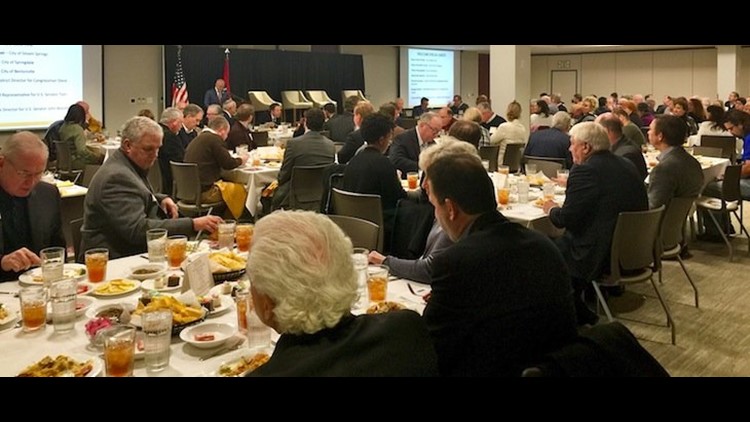SPRINGDALE (KFSM) — Northwest Arkansas business and community leaders convened Tuesday (Jan. 17) in Springdale at the Northwest Arkansas Council’s winter meeting to hear about diversity and inclusion, issues that flagship companies in the region say is crucial to recruitment of top talent.
Ben Hasan, chief diversity and inclusion officer at Wal-Mart, issued a challenge to the business leaders in the room
“This region is already diverse, we need to focus on inclusion and make Northwest Arkansas the inclusion capital of the world,” Hasan said.
Hasan was one of three panelists chosen by the Council to discuss diversity and inclusion.
The regional think tank has chosen to take a deeper dive into theissue this year.
Mary Oleksiuk, chief human resources officer at Tyson Foods, and Yvette Murphy-Erby, associate dean and professor of social work at the University of Arkansas, were the other two panelists questioned by moderator Kyle Kellams, news director at KUAF in Fayetteville.
Oleksuik said it’s easy for busy professionals to put their heads down and focus on the task at hand, but if the region is going to do a better job of inclusion it’s important to look up and take part in a bigger plan.
“Someone once told me diversity is inviting everyone to dinner, but inclusion is asking each one of them what they would like to eat,” she said.
She said Tyson Foods is working on inclusion and one of the greatest things she’s heard from families moving into the region is they tell her their children are not known as the odd ones, but are seen simply as the new kids in class.
“We have several C-level executives that have relocated their families to their region. Our chief technology officer moved from California, our CFO had a previous global assignment and our general counsel also relocated here and they know firsthand what it feels like to relocate and can identify with other new hires in the company on a personal level,” she said.
Erby said the UA takes a broad look at diversity and inclusion. She said diversity without inclusion is not effective because people need to have a sense of belonging that comes with inclusion.
Hasan said Wal-Mart believes people who feel included are more productive. Oleksiuk said Tyson knows not everyone is good at everything and it takes all types to ensure company goals are met.
The Council reports the region’s demographics continue to change with whites making up 73.3% of the total 525,032 people residing in the area last year.
While whites are still a majority in the region, the influx of other ethnicities are growing, while the white population is shrinking.
In the past seven years the white population is down from 76.27%, and the Hispanic/Latino population increased from 14.92% to 16.49% a gain of 17,510 people in the past seven years.
Asians, African Americans Native Americans and Pacific Islanders each grew their share over the seven years.
By 2022, the Council estimates regional population will reach 581,621 with minority ethnicities each growing in size and the white population shrinking to 69.45%.
To read more, visit Arkansas Talk Business & Politics.



